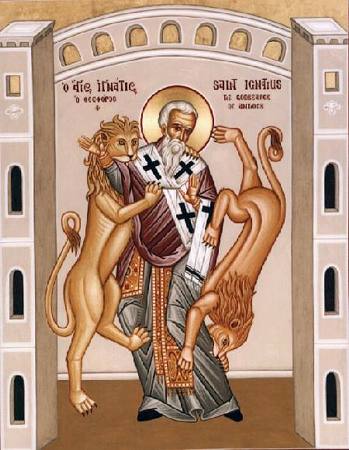Ignatius of Antioch
Código VH04-E0004-I
VIEW:413 DATA:2020-03-20
 To accept Ignatius' existence, one has to believe in the Catholic Church. The foundations of Ignatius of Antioch exist only in this Church.
To accept Ignatius' existence, one has to believe in the Catholic Church. The foundations of Ignatius of Antioch exist only in this Church.
It is said that Ignatius is an Apostle of John, but John does not quote Ignatius in his books. He says that Ignatius was Peter's successor in the Church of Antioch, but there is no biblical account that Peter was Bishop of Antioch.
The scriptures quote the teachers of Antioch.
Act 13: 1 Now in the church at Antioch there were prophets and teachers, namely: Barnabas, Simeon, called Niger, Lucius of Cyrene, Manaem, the necklace of Herod the tetrarch, and Saul.
But he does not say that Ignatius was a teacher or a prophet. Facing that he either did not exist, or was not a master. Especially if he was Peter's successor, or John's apostle.
It is therefore doubtful to determine Ignatius' accounts as archaeologically verifiable evidence. Only the idea of the Catholic Church's tradition remains.
Inácio's reference can be seen in the quotations of Eusébio de Caesarea and Origen, who diverge on Inácio's story.
Ignatius' documents are quoted in the Codex Hierosolymitanus (also called the Bryennios Manuscript or the Jerusalem Codex), generally referred to only as "H". But such a document is from an 11th century AD Greek manuscript]
It was discovered by Philotheos Bryennios, the Metropolitan of Nicomedia, in 1873 in the Metochoc Library [a] of the Church of the Holy Sepulcher in Constantinople.
Its archaeological basis is determined only by the tradition of the Church and not by extensive archaeological concepts as occurs with the Bible. The use of the Codex Hierosolymitanus, as a historical norm, is extremely doubtful, since its existence may represent only a creation of the Church in much later times.
Tal Inácio bases the Papacy system when he mentions.
"while your bishop presides in the place of God, and your presbyters in the place of the assembly of the apostles, epistle to the magnesians 6" {while the bishop presides in the place of God, and your elders in the place of the assembly of the apostles }.
The NT does not define the possibility that someone can preside over God.
The documents focus on the fact that man cannot generate awareness of the word of God directly with Christ and the Father, being obliged to obey the Church.
"As therefore the Lord did nothing without the Father, being united to Him, neither by Himself nor by the apostles, so neither do ye anything without the bishop and presbyters. Epistle to the magnesians 7" {How, therefore, the Lord did not nothing without the Father, being united to Him, neither by himself, nor by the apostles, so do not do anything without the bishop and the elders.}
"Be ye subject to the bishop, and to one another, as Jesus Christ to the Father, epistle to the magnesians 13 " {Be subject to the bishop, and to one another, as Jesus Christ to the Father,}
Give ye heed to the bishop, that God also may give heed to you. My soul be for theirs (9) that are submissive to the bishop, { Give yourselves to the bishop, that God can also listen to you. My soul is for yours who are submissive to the bishop, } Epistle for Policarp 6
The inclusion of the form of resemblance in which man must be subject to the bishop equal to Christ to the Father, is totally outside the biblical ideology in which man must be subject to Christ, and Christ to the Father, thus including a comparative subjection totally contrary to of NT.
The work of Ignatius is linked to elevation of Bishop quality of Christ and obedience to the bishop obedience to the Father. The grounded bases of the Papal order, and equally of the Pope to " Vicarius Filii Dei " {Vicar son of God} it is in the works of Ignatius, and totally without foundation in the biblical writings. His work concerns the elevation of the bishop and obedience to the church, regardless of personal conscience. Defining that the Church knows what is actually right and what is wrong. Linking that man can understand Christ and God only through the Church.
Such texts do not support an archaeological and reliable concept. It is a foundation for elevating the Bishop to the quality of God, and the authority of the church over the conscience of man. This factor does not demonstrate the apostles' way, nor is it based on the biblical foundation.
Thus, using Ignatius as a documentary base is extremely doubtful, as it manages an extremely divine classification of the Bishop and Church. Besides, there is no archaeological evidence of Ignatius' real existence, and his birth. You cannot base historical analyzes on your documents. If such a character really existed.


BUSCADAVERDADE
Visite o nosso canal youtube.com/buscadaverdade e se INSCREVA agora mesmo! Lá temos uma diversidade de temas interessantes sobre: Saúde, Receitas Saudáveis, Benefícios dos Alimentos, Benefícios das Vitaminas e Sais Minerais... Dê uma olhadinha, você vai gostar! E não se esqueça, dê o seu like e se INSCREVA! Clique abaixo e vá direto ao canal!
Saiba Mais
-
 Nutrição
Nutrição
Vegetarianismo e a Vitamina B12 -
 Receita
Receita
Como preparar a Proteína Vegetal Texturizada -
 Arqueologia
Arqueologia
Livro de Enoque é um livro profético?
Tags
Ignatius of Antioch, Fathers of the Church, Catholicism, apocryphal


